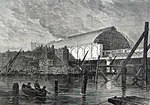Playhouse Theatre
1882 establishments in EnglandGrade II listed buildings in the City of WestminsterGrade II listed theatresTheatres completed in 1907Theatres in the City of Westminster ... and 1 more
West End theatres

The Playhouse Theatre is a West End theatre in the City of Westminster, located in Northumberland Avenue, near Trafalgar Square. The Theatre was built by F. H. Fowler and Hill with a seating capacity of 1,200. It was rebuilt in 1907 and still retains its original substage machinery. As of November 2021, the theatre has been refurbished and renamed as the Kit Kat Club, home to a new revival of Cabaret with a seating capacity of 550.
Excerpt from the Wikipedia article Playhouse Theatre (License: CC BY-SA 3.0, Authors, Images).Playhouse Theatre
Northumberland Avenue, City of Westminster Covent Garden
Geographical coordinates (GPS) Address Phone number External links Nearby Places Show on map
Geographical coordinates (GPS)
| Latitude | Longitude |
|---|---|
| N 51.506944 ° | E -0.123611 ° |
Address
Playhouse Theatre
Northumberland Avenue
WC2N 5DE City of Westminster, Covent Garden
England, United Kingdom
Open on Google Maps









